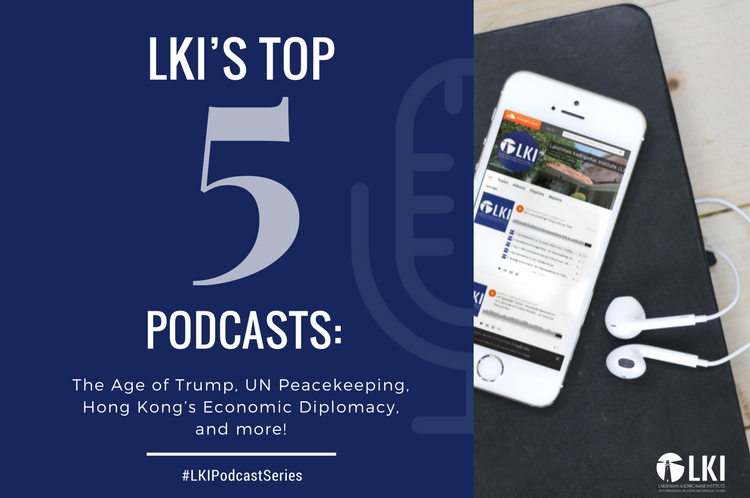April 27, 2018 Reading Time: 4 minutes
 Reading Time: 4 min read
Reading Time: 4 min readNimaya Mallikahewa*
Since the launch of the LKI’s Podcast Series in 2016, LKI has been fortunate to host many global experts who have shared their insights on the changing dynamics of the world order, and implications of those changing dynamics for Sri Lanka.
We are delighted to feature here the 5 most popular podcasts in LKI’s Podcast Series so far. Given President Trump’s evolving agenda, Brexit in Europe, and the swiftly shifting geopolitics of Asia, it comes as little surprise that our most popular podcasts revolve around these subjects.
Continued American engagement, and leadership in providing international and regional public goods…would be good news for Asia because it would continue to secure the ‘Asian Pax,’ and provide the environment for Asia to globalise, grow, and prosper.
Our top podcast features an LKI Foreign Policy Round Table with Professor Razeen Sally, Associate Professor at the Lee Kuan Yew School of Public Policy at the National University of Singapore and the Chairman of the Institute of Policy Studies in Colombo. The Round Table was moderated by LKI’s Executive Director, Dr. Dinusha Panditaratne.
Professor Sally addresses one of contemporary politics’ most highly discussed topics; possible changes in the global order under the Trump Administration, in this LKI round table discussion. He highlights economic, political and security-related changes that could affect Asia, elaborating on how these changes would, by extension, affect Sri Lanka and the surrounding region.
Those who decide where peacekeepers go have an incentive to extend the mandate to be over-ambitious, and to amplify the concern, scope and scale of what a peacekeeping operation can do, because they don’t have to bear the risks and the costs.
The inaugural episode of LKI’s Podcast Series featured an interview with Dr. Phillip Cunliffe, Senior Lecturer at the University of Kent in the UK. Dr. Cunliffe spoke on United Nations peacekeeping and the contributions of developing countries, like Sri Lanka, to peacekeeping operations. The interview was conducted by LKI’s Executive Director, Dr. Dinusha Panditaratne.
Dr. Cunliffe’s explains the security risks of peacekeeping, the offloading of these risks by powerful states to the armed forces of developing nations, and the effect of sending peacekeepers on a country’s international reputation. Dr. Cunliffe also highlights the paradox of peacekeeping, in that UN Peacekeeping increasingly involves hard power which can in turn, enhance the sending country’s soft power.
“I think it’s important to have a view of what your economic diplomacy should be and in the case of Singapore it has worked well but that model may not be so easily transposed to another situation … You may need to fall back on what I call the Hong Kong solution.”
July 2017 saw a landmark dialogue take place at LKI; the Sri Lanka Foreign Policy Forum. With the event drawing established experts and new voices from around the world, the Forum, titled “Sri Lanka’s Foreign Policy: Choices in a Changing World,” offered fresh perspectives and an opportunity to consider how Sri Lanka should move forward amid a changing global landscape.
Our third most popular podcast features a keynote address at the Forum, by Professor Chin Leng Lim, Choh Ming-Li Professor of Law at the Chinese University of Hong Kong. Professor Lim spoke on economic diplomacy, comparing the Singaporean example to Hong Kong’s practice. He cautions against seeing Singapore’s model of economic diplomacy as one that is easily transposable to other states. Instead, he recommends that states like Sri Lanka consider the ‘Hong Kong solution’ and find a unique way to stand out from the crowd.
Labor productivity in Sri Lanka is currently only 25% of U.S. labor productivity. Structural reforms are required to increase this, as higher labour productivity is crucial to increasing the quality and quantity of products.
Dr. Ganeshan Wignaraja, then an Advisor in the Office of the Chief Economist of the Asian Development Bank (ADB) in Manila and now Chair of LKI’s Global Economy programme (supported by Dilmah), spoke at an LKI Foreign Policy Round Table on implications of Asia’s trade slowdown for Sri Lanka.
Dr. Wignaraja shares his expertise on global value chains and the dynamics of Asian trade, explaining comparisons of pre-Global Financial Crisis (GFC) and post-GFC trade patterns with a focus on the growth of exports. He also highlights the causes of the export slowdown, identifying new trading opportunities for Sri Lanka and other implications for the country.
Implications of Brexit transcend economic interests in the context of populist backlash triggered by Brexit. The EU must champion universal democratic values and principles, and preserve its core values such as fundamental freedom, equality, and good governance.
Hon. Mangala Samaraweera, MP, then Minister of Foreign Affairs and Chairman of LKI, made the opening address at the lecture at LKI by Hon. Laurent Fabius, President of the Constitutional Council of France and former Prime Minister of France.
With the topic-du-jour being Brexit and Europe’s place in the international order, Hon. Mangala Samaraweera spoke on the implications of Brexit for Sri Lanka, including the potential loss of access to the Generalised Scheme of Preferences Plus (GSP+) on exports to the UK market, and the possible effects of the depreciation of the British pound on Sri Lankan exports and tourism.
Explore other episodes of LKI’s Podcast Series on LKI’s SoundCloud page. Keep an eye on LKI’s Facebook and Twitter pages for new podcasts every month.
*Nimaya Mallikahewa was a Communications Assistant at the Lakshman Kadirgamar Institute of International Relations and Strategic Studies (LKI).